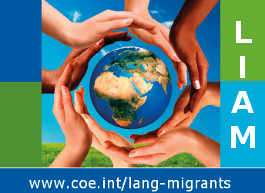Quality in education and training for migrants
The quality of education and training relates to the degree to which it meets the needs and expectations of the learners concerned and the needs of the other stakeholders, particularly those organising it and those funding it. The Council of Europe’s policy guidelines and recommendations indicate that the quality of language courses and language tests for adult migrants should also be judged according to the ways in which the courses contribute to the promotion of intercultural dialogue, foster tolerance, and support the integration of immigrants in their host societies. These principles are outlined in the Declaration and Action Plan of the Third Council of Europe Summit in Warsaw.
Quality assurance
Quality assurance is “the maintenance of a desired level of quality in a service or product, especially by means of attention to every stage of the process of delivery or production” (Oxford Dictionary). In the case of language courses for adult migrants, this includes regularly evaluating:
- Whether the real-life needs of individual migrants are being addressed in the design of language programmes
- Whether their ability to engage in relevant transactional and social exchanges with members of the host community is being strengthened, and whether they gradually experience fewer difficulties because of language problems
- Whether the culture and language(s) of adult migrants are being respected and, where relevant, supported as they learn the language and customs of the host community.
- How motivated and engaged they are by the teaching and learning activities and materials, and the way the teachers work.
The aim of quality assurance in this context is to regularly review the quality of teaching, learning, assessment and management, and if necessary to make adjustments that ensure that the needs of those receiving and sponsoring the education are met. The Council of Europe has produced a self-assessment Guide including a detailed checklist (see 'Instruments') to support managers and staff in carrying out internal quality assurance themselves. The questionnaire can also be used as a checklist when designing and setting up new language courses for adult migrants.
Quality Control
Quality assurance in education is best carried out by those directly involved in organising and teaching the courses, i.e. the institution or entity providing them. Quality control, on the other hand, is an important responsibility of those overseeing the provision, usually government agencies. Where courses for migrants are financed from public funds, there is a specific duty to demonstrate through quality measures that the courses are effective and represent ‘value for money’. In language and other courses for adult migrants, quality control is especially important because of the range of different providers, which may include community associations and voluntary bodies as well as further education colleges, distributed over a wide national area and ad hoc local management
Quality control needs to be undertaken by competent specialist in the field of adult migrant education. Procedures might include carrying out unannounced short observations of a cross section of classes for migrants, talking to randomly selected learners about specific aspects of their course, as well as by checking paperwork and the results of assessment. In some countries quality control takes the form of accreditation under a mandatory scheme involving a more formal periodic audit. This is designed to ensure that all institutions contracted by the national authorities to provide courses for migrants have achieved and maintain equivalent standards in line with government policy.
Quality management
The work of those providing courses for adult migrants is complex and demanding since such a wide variety of language needs have to be met. Quality management is needed in order to ensure that, within an organisation, there is a continual and systematic approach to quality assurance and a regular focus on identifying opportunities for improvement. However, managers and co-ordinators of language courses are not necessarily trained in this work. Suggestions as to the principles and procedures for quality management in the domain of language provision for adult migrants were offered in a thematic study presented at the Council of Europe seminar on the linguistic integration of adult migrants in 2008, Quality assurance in the provision of language education and training for adult migrants – Guidelines and options.
In certain Member States, language tests and examinations are made obligatory for adult migrants. These are usually unrelated to the language courses that are available. Quality management is, of course equally important where such tests concerned. Useful standards for language tests are outlined in the ALTE ‘Minimum standards’.
RR
Related resources
- Providers of Courses for Adult migrants : Self-assessment Handbook including a questionnaire, rev. 2014, Richard Rossner
EN FR IT SL
- Concept paper : The role of languages in policies for the integration of adult migrants, 2008, Jean-Claude Beacco
EN FR
- Quality assurance in the provision of language education and training for adult migrants – Guidelines and options, 2008, Richard Rossner.
EN FR
- Report on a survey: Language requirements for adult migrants in Council of Europe member states, 2011, Claire Extramiana, Piet van Avermaet
EN FR
- ALTE (Association of Language Testers in Europe): http://www.alte.org



